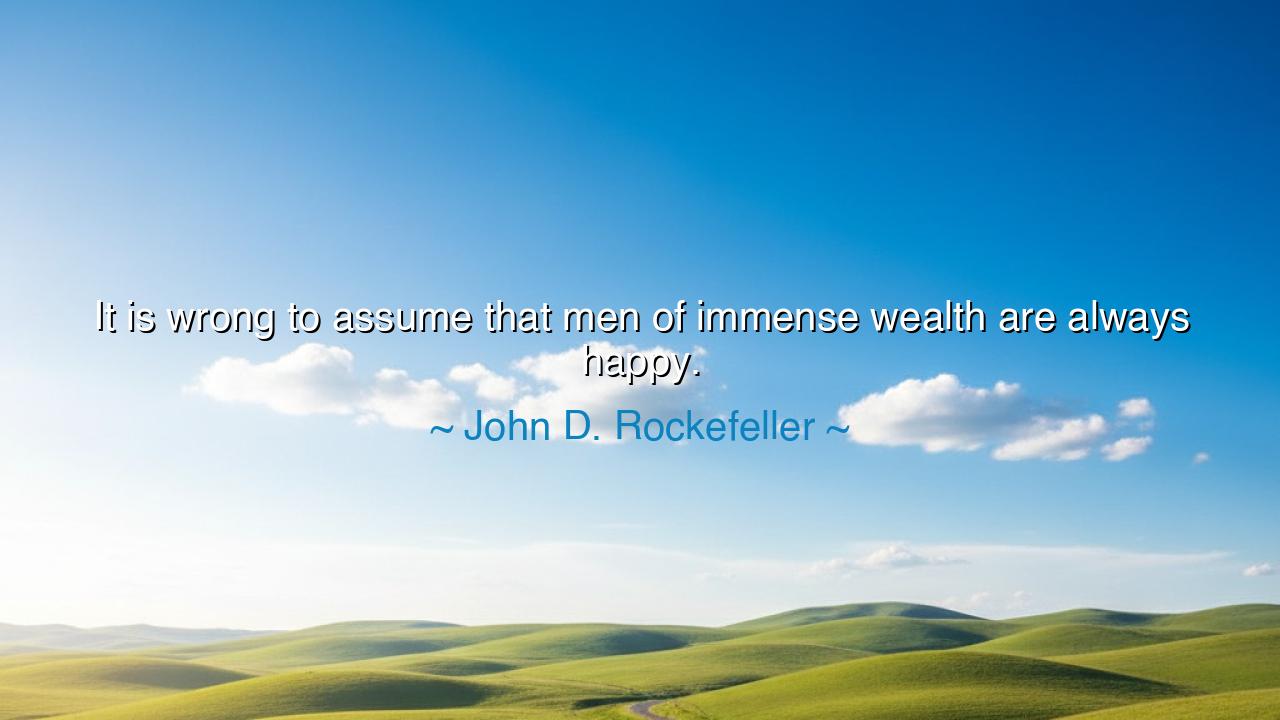
It is wrong to assume that men of immense wealth are always






Hear the words of John D. Rockefeller, the titan of industry, who declared: “It is wrong to assume that men of immense wealth are always happy.” These words, spoken by one of the richest men the world has ever known, are not idle musings, but a confession born of experience. They reveal a truth long hidden behind the glitter of gold: that riches, however vast, do not guarantee joy, nor do they shield the soul from emptiness. Wealth may buy comfort, but it cannot buy contentment; it may build palaces, but it cannot build peace.
The origin of this wisdom lies in the life of Rockefeller himself. He amassed a fortune so great that it seemed almost divine, commanding oil empires and influencing the very structure of modern commerce. To the world, he appeared untouchable, a man crowned with prosperity. Yet in the quiet of his life, he suffered from anxiety, illness, and the endless weight of his own ambition. His wealth could not silence worry, nor could it heal the unrest within. Thus he came to see what few will believe until they learn it themselves: that happiness and wealth are not the same.
Consider the tale of King Midas of ancient Greece. He prayed that everything he touched might turn to gold, and his wish was granted. At first he rejoiced, but soon he discovered the curse: food became metal, his drink turned to stone, and even his beloved daughter was transformed by his grasp. Midas wept, for in seeking wealth, he had lost the very essence of life. So too does Rockefeller’s warning echo this ancient parable: immense wealth may glitter, but if sought without wisdom, it turns to dust in the heart.
History shows this lesson again in the life of Howard Hughes, the aviator and magnate of the twentieth century. Surrounded by riches beyond measure, Hughes withdrew into solitude, consumed by fear and obsession. His wealth did not free him—it imprisoned him. He died not as a joyful king of industry, but as a broken soul, reminding us once more that fortune alone cannot bring peace. Riches may enlarge the walls of a man’s house, but they cannot enlarge his heart.
Yet this truth should not turn us into enemies of wealth. Rockefeller himself used his riches for great acts of philanthropy, building schools, universities, and institutions that served generations. His words do not condemn fortune itself, but the illusion that fortune equals joy. Happiness arises not from the abundance of possessions, but from purpose, gratitude, and love. The man who has little but lives in peace is richer than the king who feasts in sorrow.
The lesson, then, is clear: do not envy those who possess immense wealth, for their burdens may be heavier than your own. And do not waste your life chasing riches as though they were the highest good. Seek instead the wealth of the spirit: integrity, kindness, wisdom, and peace of mind. These treasures cannot be stolen, cannot rust, cannot be spent away. They are the foundation of true happiness.
Therefore, O listener, remember Rockefeller’s warning. Let money serve you, but do not serve it. Let wealth be a tool, not a master. Build your joy not on gold, but on the eternal riches of the heart. For when the day of reckoning comes, and your name is spoken by those who remember you, it will not be the size of your fortune they honor, but the greatness of your spirit. Happiness is not sold in markets, nor stored in vaults—it is sown in the soul.






AAdministratorAdministrator
Welcome, honored guests. Please leave a comment, we will respond soon